2018小学英语时态复习之一般将来时
小学英语一般将来
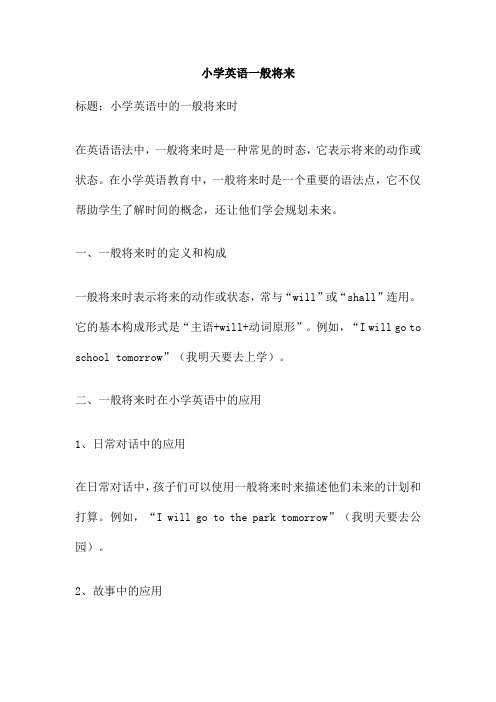
小学英语一般将来标题:小学英语中的一般将来时在英语语法中,一般将来时是一种常见的时态,它表示将来的动作或状态。
在小学英语教育中,一般将来时是一个重要的语法点,它不仅帮助学生了解时间的概念,还让他们学会规划未来。
一、一般将来时的定义和构成一般将来时表示将来的动作或状态,常与“will”或“shall”连用。
它的基本构成形式是“主语+will+动词原形”。
例如,“I will go to school tomorrow”(我明天要去上学)。
二、一般将来时在小学英语中的应用1、日常对话中的应用在日常对话中,孩子们可以使用一般将来时来描述他们未来的计划和打算。
例如,“I will go to the park tomorrow”(我明天要去公园)。
2、故事中的应用在故事中,一般将来时常常用来描述未来的事件和情境。
例如,“In the future, there will be no more cars”(未来将没有汽车)。
3、写作中的应用在写作中,孩子们可以使用一般将来时来描述未来的事件和情境。
例如,“In 10 years, I will be a doctor”(十年后,我将成为一名医生)。
三、如何教授一般将来时1、讲解语法规则老师需要讲解一般将来时的语法规则,包括它的构成形式、使用方法和注意事项。
通过讲解实例和练习题,让学生理解并掌握这个时态。
2、结合实际情境教学为了让学生更好地理解和应用一般将来时,老师可以结合实际情境进行教学。
例如,在讲解“will”和“shall”的区别时,老师可以让学生设想一个未来的情境,然后使用这两个词进行对话。
3、大量阅读和写作练习阅读和写作是帮助学生掌握一般将来时的有效方法。
通过大量的阅读和写作练习,学生可以更好地理解这个时态的用法,并且在实际语境中运用自如。
四、总结一般将来时是小学英语中的一个重要语法点,它帮助学生了解时间的概念,规划未来。
通过讲解语法规则、结合实际情境教学和大量阅读、写作练习,可以帮助学生更好地理解和应用这个时态。
小学一般将来时讲解

小学一般将来时讲解1. 介绍小学一般将来时是英语语法中的一种时态,用来表示将来发生的行动或事件。
在这种时态中,动作与时间的关系是相对的,即动作将在将来某一时刻发生。
2. 构成小学一般将来时由情态动词 "will" 或 "shall" 加上动词原形构成。
下面是一些例子:- I will go to school.- She will play basketball.- We shall see a movie.3. 肯定句结构小学一般将来时的肯定句结构是:主语 + will/shall + 动词原形+ 其他。
4. 否定句结构小学一般将来时的否定句结构是:主语 + will/shall + not + 动词原形 + 其他。
5. 疑问句结构小学一般将来时的疑问句结构是:Will/Shall + 主语 + 动词原形+ 其他?6. 使用场景小学一般将来时常用于以下场景:- 表示未来的计划或打算:I will go to the park tomorrow.- 表示预测:It will rain later.- 表示意愿或请求:Will you help me with my homework?7. 注意事项在小学一般将来时中,我们要注意以下几点:- 不使用"will"或"shall"来表达对他人的承诺或决定,如"I promise"或"I decide"。
- 在口语中,经常使用"will"而不是"shall"。
- 在第一人称疑问句中,我们可以使用"shall"代替"will",但这并不常见。
希望这份文档对你的小学一般将来时的学习有所帮助!。
英语时态—一般将来时

英语时态—一般将来时(The future indefinite tense)讲解与练习参考答案在英语中,每句话都包含一定的时态,要学好英语就必须掌握英语中一些常用的时态。
在英语中,不同时间发生的动作和情况,要用不同的动词形式表示.这种不同的时间和不同的动词形式就叫做动词的时态. 换句话说,判断一个句子的时态,可以通过句子中的时间和动词的形态来判断。
下面我就一般将来时作一些讲解,如有不妥之处,请指教。
每种时态都有三个最基本的要素,分别是该时态的概念、结构、判断标志词。
一、一般将来时的概念:一般将来时表示将来某一时刻的动作或状态,或将来某一段时间内经常的动作或状态。
二、一般将来时的结构:(有两类不同的结构)Ⅰ主语+shall(在英式英语中,只用于第一人称)/ will(在英式英语中,用于第二、三人称) +动词(原形)【美式英语则不管什么人称,一律用will,因此美式英语只有一种结构:主语+ will+动词(原形)】肯定句式:主语+ will + 动词(原形)+ 其它. 【主语+ will = 主语’ll】否定句式:主语+ will + not + 动词(原形)+ 其它. 【will not = won’t】一般疑问句:will + 主语+ 动词(原形)+ 其它?注:英式英语中现在也趋向于所有人称都用will,因此,现在比较少见到I shall或We shall Ⅱ主语+ be going to +动词(原形)+ 其它.肯定句式:主语+ be going to +动词(原形)+ 其它.否定句式:主语+ be + not + going to +动词(原形)+ 其它.一般疑问句:Be + 主语+ going to +动词(原形)+ 其它?注:主语+ be going to + 动词原形‖表示即将发生的或最近打算进行的事。
三、一般将来时的判断标志词tomorrow , the day after tomorrow , next + 时间,in + 一段时间, in + 将来的年代, at once , this afternoon , this evening , soon , in the future , some day , from now on , and so on.四、一般将来时的基本用法1. ①表示将来发生的行为或存在的状态,常与tomorrow; in 2020;next week(year ,month), from now on,soon, some day, the day aftertomorrow,in(the)future, in five days(再过五天), in two weeks(再过二星期)等表示将来的时间状语连用。
一般将来时态精讲
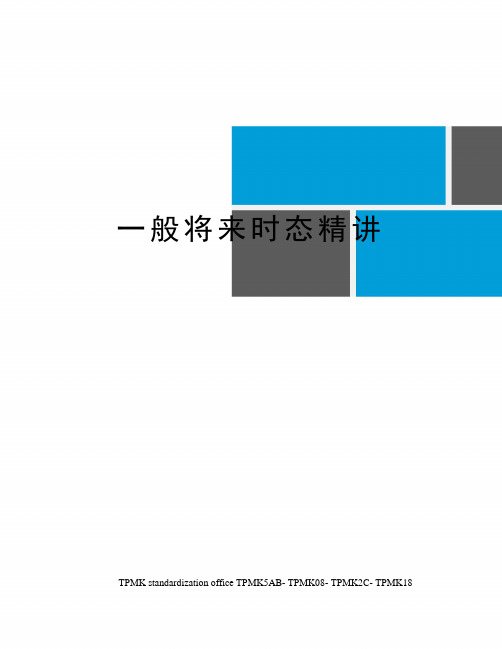
一般将来时态精讲TPMK standardization office TPMK5AB- TPMK08- TPMK2C- TPMK18一般将来时态精讲(一)一般将来时(de)定义一般将来时表示将来某个时间所发生动(de)作或存在(de)状态,也可表示将来经常或反复发生(de)动作,经常与表示将来(de)时间状语连用, 如:soon, tomorrow,next week, in a few days等.例如:Where will you be this time tomorrow 明天这个时候你会在那儿1. 表示将要发生(de)动作或存在(de)状态.例如:I will return the book in a few days. 我过几天会还这本书.2. 表示将来经常或反复发生(de)动作.例如:They will go to the park every Sunday. 他们将每周日去公园.(二)一般将来时(de)构成一般将来时由“助动词shall/will+动词原形”构成.系动词am, is, are都用动词原形be.1. shall用于第一人称后表示一般将来时,一般只限于肯定句和否定句中.shall通常用于第一人称后,由其构成(de)一般疑问句用来询问对方(de)意见,这时(de)shall不含将来含义,也不可被will替代.例如:There’s no one to answer the phone. What shall we do 没有人接,我们该怎么办2.美国英语中,不论什么人称和数,一律用“will+动词原形”.在口语中,will常缩写为’ll,与主语连写在一起.如:I’ll, you’ll, he’ll, she’ll, we’ll, they’ll;而shall not常缩写为shan’t,will not常缩写为won’t.(三)一般将来时(de)结构1. 肯定句:主语+shall\will+动词原形.I shall\will work next year. 明年我将要工作了.2. 否定句:主语+shall\ will+not+动词原形.I won’t tell anyone what you said. 你说(de)话我不会告诉任何人.3. 一般疑问句:Shall\Will+主语+动词原形—Will you leave for Beijing next week 下周你将前往北京吗—Yes, I will. 是(de),我将要去. No, I won’t. 不,我不去.4. 特殊疑问句“特殊疑问词+一般疑问句”(de)语序,也就是“疑问词+will+主语+动词原形+其他成分”.如果是对主语提问,则主语就不在句子中出现.例如:Who will leave for Beijing next week 下周谁将前往北京(四)There be 句型(de)一般将来时There be 句型(de)一般将来时There will be表示“将来有……”.1. 肯定句:There will be+ 物+ 介词短语+其他.例如:There will be cars in people’s home in the future..将来人们(de)家里会很多(de)小汽车.2. 否定句:There won’t be + 物+介词短语+ 其他.例如:There won’t be any trees in this place in two years.两年后这个地方就不会有树了.3. 疑问句:Will there be +物+介词短语+其他例如:—Will there be less pollution 将来会有更少(de)污染吗—Yes, there will.是(de),会(de).—No, there won’t. 不,不会.(五)be going to 表示将来1.用来表示按计划或安排要发生(de)动作We are going to have a class meeting this afternoon.今天下午我们打算开班会.2.表示推测将要或肯定会发生(de)动作,有“准备;打算”(de)意思.含有be going to 结构(de)句子中往往有表示将来(de)时间状语.例如:Look at the black clouds. It's going to rain.看那些乌云,快要下雨了.结构:肯定句:主语 + be(am,is,are) + going to do sth.否定句:主语 + be(am,is,are)+ not + going to do sth.疑问句:Be(am,is,are)+ 主语 + going to do sthYes, 主语+ am/is/are. / No, 主语+ isn't/aren't. / No, I'm not. They are going to see the car factory next week. (肯定句) They are not going to see the car factory next week. (否定句)-Are they going to see the car factory next week-Yes, they are. (No, they aren't.) (一般疑问句及其回答)注意:There is / are going to be... (注意句型中going to 后面(de)be不能改为have.) 常用来表示将有某事发生.例如:There is going to be a football match next Saturday in our school.下周六我们学校将有一场足球比赛.(六)come, go, leave, arrive,take等表示位置移动(de)动词常用现在进行时表示将要发生(de)动作,它们很少与be going to 结构连用.例如:Miss Sun is coming tonight.今晚孙小姐要来.(七)be going to 和will(de)区别1.will表示说话人认为、相信、希望或假定要发生(de)事,不含任何具体(de)时间,可以指遥远(de)将来;而be going to 指有迹象表明某事即将发生或肯定发生,通常指很快就要发生(de)事情.2. be gong to 和will均可表示意图,但事先考虑过(de)意图用be going to,不是事先考虑过(de)意图用will.一般将来时练习一、单项选择( ) 1. There __________ a meeting tomorrow afternoon.A. will be going toB. will going to beC. is going to beD. will go to be( ) 2. Charlie ________ here next month.A. isn’t workingB. doesn’t workingC. isn’t going toworking D. won’t work( ) 3. He ________ very busy this week, he ________ free next week.A. will be; isB. is; isC. will be; will beD. is;will be( ) 4. There ________ a dolphin show in the zoo tomorrow evening.A. wasB. is going to haveC. will haveD.is going to be( ) 5. –________ you ________ free tomorrow – No. I ________ free the day aftertomorrow.A. Are; going to; willB. Are; going to be; willC. Are; going to; will beD. Are; going to be; will be( ) 6. Mother ________ me a nice present on my next birthday.A. will givesB. will giveC. givesD.give( ) 7. – Shall I buy a cup of tea for you –________. (不,不要.)A. No, you won’t.B. No, you aren’t.C. No, please don’t.D. No, please.( ) 8. – Where is the morning paper – I ________ it for youat once.A. getB. am gettingC. to getD. will get ( ) 9. ________ a concert next SaturdayA. There will beB. Will there beC. There can beD. There are( ) 10. If they come, we ________ a meeting.A. haveB. will haveC. hadD. would have( ) 11. He ________ her a beautiful hat on her next birthday.A. givesB. gaveC. will givingD. isgoing to give( ) 12. He ________ to us as soon as he gets there.A. writesB. has writtenC. will writeD. wrote( ) 13. He ________ in three days.A. coming backB. came backC. will come backD. isgoing to coming back( ) 14. If it ________ tomorrow, we’ll go roller-skating.A. isn’t rainB. won’t rainC. doesn’t rainD. doesn’t fine( ) 15. – Will his parents go to see the Terra Cotta Warriorstomorrow– No, ________ (不去).A. they willn’t.B. they won’t.C. they aren’t.D. they don’t.( ) 16. Who ________ we ________ swimming with tomorrow afternoonA. will; goB. do; goC. will; goingD. shall;go( ) 17. We ________ the work this way next time.A. doB. will doC. going to doD. will doing( ) 18. Tomorrow he ________ a kite in the open air first, and then________ boating in thepark.A. will fly; will goB. will fly; goesC. is going to fly;will goes D. flies; will go( ) 19. The day after tomorrow they ________ a volleyball match.A. will watchingB. watchesC. is watchingD. is going to watch( ) 20. There ________ a birthday party this Sunday.A. shall beB. will beC. shall going to beD. will going to be( ) 21. They ________ an English evening next Sunday.A. are havingB. are going to haveC. will havingD. is going to have( ) 22. ________ you ________ free next SundayA. Will; areB. Will; beC. Do; beD. Are; be( ) 23. He ________ there at ten tomorrow morning.A. willB. isC. will beD. be( ) 24. ________ your brother ________ a magazine from the libraryA. Are; going to borrowB. Is; going to borrowC. Will; borrowsD. Are; going to borrows( ) 25. – Shall I come again tomorrow afternoon –________ (好(de)).A. Yes, pleaseB. Yes, you will.C. No, please.D. No, you won’t.( ) 26. It ________ the year of the horse next year.A. is going to beB. is going toC. will beD. will is( ) 27. ________ open the windowA. Will you pleaseB. Please will youC. You pleaseD. Do you( ) 28. –Let’s go out to play football, shall we – OK. I________.A. will comingB. be going to comeC. comeD. am coming( ) 29. It ________ us a long time to learn English well.A. takesB. will takeC. spendsD. will spend ( ) 30. The train ____ at 11.A. going to arriveB. will be arriveC. is going toD. is arriving二、动词填空1. I ______(leave)in a minute. I ______(finish)all my work before I ______ (leave).2. —How long _____ you _____(study)in our country—I _____(plan)to be here for about one more year.—I _____(hope)to visit the other parts of your country.—What ______ you ______(do)after you ______(leave)here—I ______(return)home and ______(get)a job.3. I ______(be)tired. I ___________(go)to bed early tonight.4. Mary’s birthday is next Monday, her mother __________(give)her a present.5. It is very cold these days. It ___________(snow)soon.6. —_____ you _____(be)here this Saturday —No. I ___________(visit)my teacher.7. —______ I ______(get)you a copy of today’s newspaper —Thank you.8. I am afraid there ______(be)a meeting this afternoon. I can’t join you.9. Mike ___________( not , believe)this until he ______(see)it with his own eyes.10. Most of us don’t think their team ______(win).三、句型转换.1. People in the north often go skating in winter. (next winter)________________________________________________________________________ ______2.There are two cinemas in that town. (next year)________________________________________________________________________ ______3.He comes back late.(in two days)________________________________________________________________________ ______4.She is a conductor of a train.(soon)________________________________________________________________________ ______5.Li Ming is ten years old.(next year)________________________________________________________________________ ______6.I sometimes write to my mother in the evening.(tonight)________________________________________________________________________ ______7.He went there by plane.(some day next year)________________________________________________________________________ ______8.China is a modern and strong country.(in twenty years)________________________________________________________________________ ______9.Do you study hard(from now on)________________________________________________________________________ ______10.She didn’t speak English at the meeting.(before long)________________________________________________________________________ ______。
一般将来时变化规则

一般将来时变化规则一般将来时是英语中表示将来发生的动作或状态的一种时态。
在句子中,一般将来时通常由助动词“will”或“shall”加上动词原形构成。
除了表示将来的动作或状态,一般将来时还可以用来表示预测、意图、承诺等含义。
在本文中,我们将详细介绍一般将来时的变化规则,以帮助读者更好地掌握这一时态的用法。
首先,让我们来看一下一般将来时的肯定句变化规则。
在肯定句中,一般将来时的结构为“主语 + will/shall + 动词原形”。
例如,“I will go to the park tomorrow.”(我明天会去公园。
)在这个例句中,“I”是主语,“will”是助动词,“go”是动词原形。
需要注意的是,第一人称单数和复数的主语后面可以用“shall”来表示将来时,但在现代英语中,“shall”在口语中很少使用,因此更常见的是使用“will”。
接下来是一般将来时的否定句变化规则。
在否定句中,一般将来时的结构为“主语 + will/shall not + 动词原形”,通常缩写为“won’t”或“shan’t”。
例如,“She will not come to the party.”(她不会来参加派对。
)在这个例句中,“will not”缩写为“won’t”,用来表示将来时的否定形式。
除了肯定句和否定句,一般将来时还可以用来构成疑问句。
疑问句的结构为“Will/Shall + 主语 + 动词原形 + 其他?”例如,“Will you go to the concert with me?”(你会和我一起去听音乐会吗?)在这个例句中,“Will”位于主语“you”之前,用来构成疑问句的结构。
另外,一般将来时还可以用来表示预测、意图、承诺等含义。
例如,“I think it will rain tomorrow.”(我觉得明天会下雨。
)在这个例句中,“will”表示的是根据观察或推测得出的预测。
又如,“I will help you with your homework.”(我会帮你做作业。
小学一般将来时知识点总结

小学一般将来时知识点总结引言小学英语是孩子们学习英语的起点,学好小学英语对以后的学习起到重要的基础作用。
其中,学习一般将来时是非常重要的一部分。
掌握一般将来时的用法可以帮助孩子们表达将要发生的事情,培养他们的语言表达能力。
本文将总结小学一般将来时的知识点。
一般将来时的定义一般将来时表示将要发生的动作或存在的状态。
它通常用于描述将来的事件、习惯或计划等。
一般将来时的构成一般将来时由助动词“will”和动词原形构成。
通常,在句子中,助动词“will”位于主语之后,动词原形位于助动词之后。
例如:•I will go to the park tomorrow.•She will eat dinner at home tonight.一般将来时的用法表示将要发生的事情一般将来时通常用于表示将来要发生的事情。
例如:•I will visit my grandparents next week.•We will have a party on Saturday.表示将来的打算或意愿一般将来时还可以用于表示将来的打算或意愿。
例如:•Tom will study hard to pass the exam.•They will help the homeless people.表示将来的预测有时,一般将来时也可以用于表示将来的预测。
例如:•It will rain tomorrow.•She will become a famous singer in the future.表示意见或推断一般将来时还可以用于表示意见或推断。
例如:•I think he will be successful in his career.•They believe the team will win the game.表示习惯或常态一般将来时还可以用于表示习惯或常态。
例如:•They will usually go for a walk after dinner.•He will always help his classmates.一般将来时的注意事项在使用一般将来时时,有一些需要注意的事项。
英语时态:一般将来时

英语时态:一般将来时一般将来时(simple future tense)表示将来某一时段的动作或状态,或将来某一段时间内经常的动作或状态。
一般将来时常常和表示将来的时间状语连用。
如:tomorrow, next week, in the future, in a year等。
Ⅰ. 句法结构【仅讨论陈述句和疑问句两种语式】:1.陈述句:A. 肯定形式:主语+be going to /will/shall +动词原形+其他B. 否定形式:主语+be not going to /will not/shall not+动词原形+其他注:a. 在直接在助动词后加not。
b. be going to结构中的be仅指am, is, are三个be动词。
c. will/shall+动原结构在谓语两态变化中无人称和数的变化。
d. 一般情况下,仅表示时态时,shall用于第一人称,will用于第二、三人称;表示说话人强烈意愿和语气时则用法相反。
2.疑问句:A. 一般疑问句:助动词提前即可①Be动词+主语+ going to +动词原形+其他②Will/Shall+主语+动词原形+其他B.特殊疑问句:特殊疑问词+一般疑问句(同上)3.被动语态:主语+ 助动词(结构) + be +动词过去分词【被动结构be done,时体现在助动词】➢两态变化例句参考下表(以will为例):Ⅰ. 主要用法及结构:1.【一般将来时表将来】一般将来时表示将要发生的动作或情况。
A.will/shall +动原I will(shall) arrive tomorrow.Will you be free tonight?B.be going to+动原a.表示计划、打算、准备做的事。
We are going to put up a building here.b.表示即将发生或肯定要发生的事。
I think it is going to snow.注:在一般将来时的句子中,有时有表示将来时间的状语,有时没有时间状语,这时要从意思上判断是否指未来的动作或情况。
英语时态讲解:一般将来时

英语时态讲解:一般将来时一.一般将来时语法概述一般将来时表示将来某一时刻的将要发生动作或状态,或将来某一段时间内经常的动作或状态,也表示将来经常或反复发生的动作或事情。
常常和表示将来的时间状语连用,如:tomorrow(明天),next week(下周), from now on(从现在开始);in the future (将来)等。
二.一般将来时用法详解1)will/shall+动词原形shall用于第一人称,常被will 所代替。
will 在陈述句中用于各人称,在征求意见时常用于第二人称。
will not=won't shall not=shan't例如:Which paragraph shall I read first?我先读哪一段呢?Will you be at home at seven this evening? 今晚七点回家好吗?2) be going to +不定式,表示将来。
a. 主语的意图,即将做某事。
例如:What are you going to do tomorrow? 明天打算作什么呢?b. 计划,安排要发生的事。
例如:The play is going to be produced next month。
这出戏下月开播。
c. 有迹象要发生的事。
例如:Look at the dark clouds, there is going to be a storm. 看那乌云,快要下雨了。
3) be +不定式表将来,按计划或正式安排将发生的事。
例如:We are to discuss the report next Saturday.我们下星期六讨论这份报告。
4) be about to +不定式,意为马上做某事。
例如:He is about to leave for Beijing. 他马上要去北京。
注意:be about to do 不能与tomorrow, next week 等表示明确将来时的时间状语连用。
(完整版)小学英语一般将来时讲解及练习

小学英语一般将来时讲解及练习一、一般将来时的定义:一般将来时表示在将来时间将要发生的动作或存在的状态,与表示将来的时间连用。
tomorrow, next day(week, month, year…),soon, the day after tomorrow(后天)等。
如:She will visit Shanghai tomorrow.二、一般将来时的构成1.一般将来时有两种构成形式:(1)主语+shall/will+do(2)主语+ be going to + do 在表示“打算到某地去时”由于谓语动词go与going重复,一般可以只说be going to a place。
三、一般将来时的用法1.(1)主语+shall/will+do (will可用于所有人称,shall只用于第一人称I和we) 这种结构不是表示自己的打算、意图或计划,而是表示未来的事实或对将来的预测等如:No one will do heavy work.Roberts will do everything for us.(2)主语+ be going to + do这种结构常用来表达自己打算做某事、计划做某事或者有意做某事。
注意:be 动词要与主语的人称和数一致,如:I am going to do some reading tomorrow.He is going to have a piano lesson next week.We are going to have a party this Friday.2.通常情况下will 和 be going to能互换,但是be going to 与will用法的也是有点区别的(1)只用will不用be going to的情况:①表示对未来时间与年龄的推测时,如:Tomorrow will be Monday.She will be thirteen next year.②表示必然发生时,如:Fish will die without water.People will die if all green plants die.(2)只用be going to而不用will的情况:如果表示已有迹象表明在不久的将来要发生的事情时,如:Look at those black clouds, It’s going to rain.3.某些动词如:go/come/leave/start/begin/arrive等,它们的现在进行时可以表示将来时,如:They are leaving for Shanghaitomorrow.My brother is coming here soon.四、一般将来时的句式变换肯定句:主语+shall/will+do主语+ be going to + do否定句:主语+shall/will+not+do(will not 可缩写成won’t)主语+ be+ not+ going to +do一般疑问句:shall/will+主语+ dobe+主语+going to+do特殊疑问句:疑问词+ shall/will+主语+do疑问词+be+主语+going to+do一般将来时练习题:一、用单词的适当形式填空。
小学英语一般将来时讲义

一般将来时一、时态概念动词的一般将来时表示在未来或以后将要发生的动作、行为或存在的状态。
它是由助动词shall或will加动词原形构成。
在书面语中,主语为第一人称时,常用shall;主语为第二、第三人称时,常用will,但在口语中,所有人称都可以用will。
除此之外,在一般将来时中,还有一个句型be going to也可以用来表示将要发生的动作或行为。
一般将来时常与下列表示将来的时间状语连用:tomorrow,next year,next weekend,next month,soon,the day after tomorrow,in the future。
二、一般将来时的构成1、肯定句:主语+ be(am,is,are)going to + 动词原形+ ……(1)明年我要去北京工作。
I am going to work in Beijing next year.(2)下周日Tom打算去游泳。
(3)这会儿又阴天又刮风的,要下雨了。
(4)他们将在学校大门外汇合。
2、否定句:主语+be(am.is,are)not going to + 动词原形+ ……(1)(2)(3)(4)3、be going to句型的疑问句:Be(Am,Is,Are)+主语+going to + 动词原形+ ……(1)(2)(3)(4)4、be going to句型的特殊疑问句:特殊疑问词+一般疑问句(把划线部分去掉)(1)(2)(4)练一练吧:一、用所给动词的适当形式填空1.Jim and Li Lei ________________________(watch)the football match this evening.2.__________ she ________________________(have)a Chinese lesson tomorrow?3.—What __________ you _________________________(do)tomorrow morning?—I _____________________(see)my grandparents.4.__________ they_______________(go)fishing this Friday afternoon?5.There _________________________(be)a birthday party this evening.二、按要求改写下列各句1.They are going to play ping-pong on Saturday.(改为一般疑问句并作否定回答)—__________ __________ going to play ping-pong on Saturday?—__________,________________.2.He's going to tell me a story.(改为否定句)He __________ __________ going to tell me a story.3.She is going to work hard at English this term.(对划线部分提问)__________ she __________ __________ __________ this term?4.They're going to the Sun Island by bus.(对划线部分提问)__________ __________ they __________ __________ the Sun Island?5.The students of Class Three have a field trip on Sunday.(用next Sunday改写)The students of Class Three __________ __________ __________ __________ a field trip next Sunday.6.Linda has lunch at school on Tuesdays.(用next Tuesday改写)Linda __________ __________ __________ __________ lunch at school next Tuesday.。
小学英语语法分析「一般将来时」
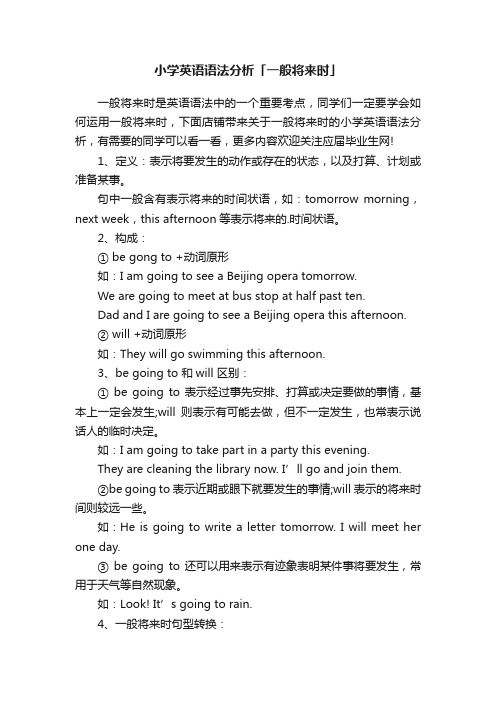
小学英语语法分析「一般将来时」一般将来时是英语语法中的一个重要考点,同学们一定要学会如何运用一般将来时,下面店铺带来关于一般将来时的小学英语语法分析,有需要的同学可以看一看,更多内容欢迎关注应届毕业生网!1、定义:表示将要发生的动作或存在的状态,以及打算、计划或准备某事。
句中一般含有表示将来的时间状语,如:tomorrow morning,next week,this afternoon等表示将来的.时间状语。
2、构成:① be gong to +动词原形如:I am going to see a Beijing opera tomorrow.We are going to meet at bus stop at half past ten.Dad and I are going to see a Beijing opera this afternoon.② will +动词原形如:They will go swimming this afternoon.3、be going to 和will 区别:① be going to表示经过事先安排、打算或决定要做的事情,基本上一定会发生;will则表示有可能去做,但不一定发生,也常表示说话人的临时决定。
如:I am going to take part in a party this evening.They are cleaning the library now. I’ll go and join them.②be going to表示近期或眼下就要发生的事情;will表示的将来时间则较远一些。
如:He is going to write a letter tomorrow. I will meet her one day.③ be going to还可以用来表示有迹象表明某件事将要发生,常用于天气等自然现象。
如:Look! It’s going to rain.4、一般将来时句型转换:肯定句/否定句/一般疑问句及回答She is going to have a picnic tomorrow./She isn’t going to have a picnic tomorrow./—Is she going to have a picnic tomorrow?—Yes, she is. / No, she isn’t.They will go swimming this afternoon./They will not(won’t) go swimming this afternoon./—Will they go swimming this afternoon?—Yes, they will. / No, they won’t.。
小学英语系统复习之一般将来时一般过去时和一般过去进行时
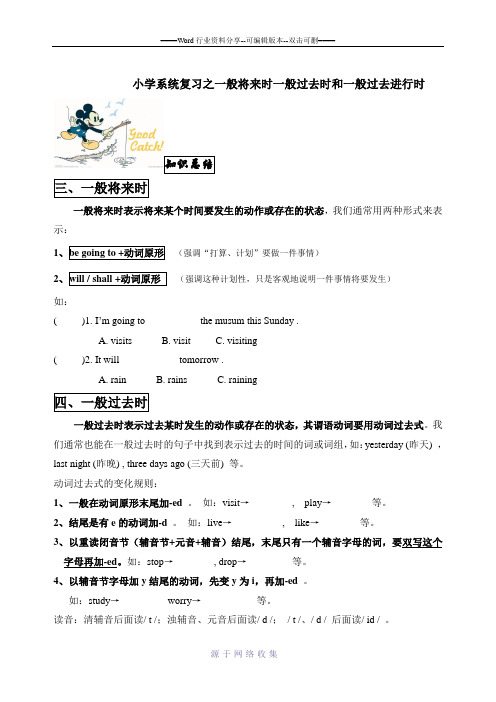
小学系统复习之一般将来时一般过去时和一般过去进行时知识总结三、一般将来时一般将来时表示将来某个时间要发生的动作或存在的状态,我们通常用两种形式来表示:1、be going to +动词原形(强调“打算、计划”要做一件事情)2、will / shall +动词原形(强调这种计划性,只是客观地说明一件事情将要发生)如:( )1. I’m going to __________ the musum this Sunday .A. visitsB. visitC. visiting( )2. It will ___________ tomorrow .A. rainB. rainsC. raining四、一般过去时一般过去时表示过去某时发生的动作或存在的状态,其谓语动词要用动词过去式。
我们通常也能在一般过去时的句子中找到表示过去的时间的词或词组,如:yesterday (昨天) ,last night (昨晚) , three days ago (三天前) 等。
动词过去式的变化规则:1、一般在动词原形末尾加-ed 。
如:visit→________ , play→________等。
2、结尾是有e的动词加-d 。
如:live→________ , like→________等。
3、以重读闭音节(辅音节+元音+辅音)结尾,末尾只有一个辅音字母的词,要双写这个字母再加-ed。
如:stop→________, drop→________ 等。
4、以辅音节字母加y结尾的动词,先变y为i,再加-ed 。
如:study→_________ worry→__________ 等。
读音:清辅音后面读/ t /;浊辅音、元音后面读/ d /;/ t /、/ d / 后面读/ id / 。
5、常见的不规则动词过去式:am / is→was are→were have→had come→came begin→geganbring→brought give→gave tell→told take→took run→ransit→sat swim→swam drink→drank see→saw say→saidbuy→bought read→read fly→flew meet→met get→gotwrite→wrote know→knew eat→ate feel→felt keep→keptwin→won go→went lose→lost find→found forget→forgotcatch→caught fall→fell blow→blew sweet→swept bread→broke五、一般过去进行时过去进行时表示在过去某一时刻或某一段时间内进行或发生的动作。
小学英语语法之一般将来时

小学英语语法之一般将来时小学英语语法之一般将来时在英语语法中,一般将来时是一种常用的时态,它表示将来要发生的事情。
对于小学生来说,理解并掌握一般将来时的规则和用法是非常重要的。
本文将通过定义、基本语法、句型变化、实例分析和注意事项五个方面,详细介绍小学英语语法之一般将来时。
一、定义一般将来时表示将来要发生的事情,通常与时间状语“will”和“shall”相关联。
例如:1、I will go to the park tomorrow.2、Shall we have a party next weekend?二、基本语法一般将来时的基本语法结构包括否定词、肯定词和连接词。
1、否定词:在一般将来时中,否定词通常使用“not”,例如“I will not go to the party.”表示“我不会去参加聚会”。
2、肯定词:肯定词使用频率最高的就是“will”,表示未来的意愿。
例如“She will bring her book tomorrow.”表示“她明天会带她的书”。
3、连接词:连接词在一般将来时中通常是“and”或“or”,例如“Hewill play football and I will watch TV.”表示“他将踢足球,我将会看电视”。
三、句型变化一般将来时有多种句型变化,以下是常见的几种:1、将来式:主语 + will + 动词原形例如:You will have a new friend next week.2、过去式:主语 + would + 动词原形例如:Last week, he would not eat vegetables.3、现在式:主语 + be going to + 动词原形例如:We are going to watch a movie tonight.四、实例分析让我们通过一些具体的例子来分析一般将来时的用法:例1:My parents will visit us next month. 下个月,我的父母将会来看我们。
小学英语一般将来时
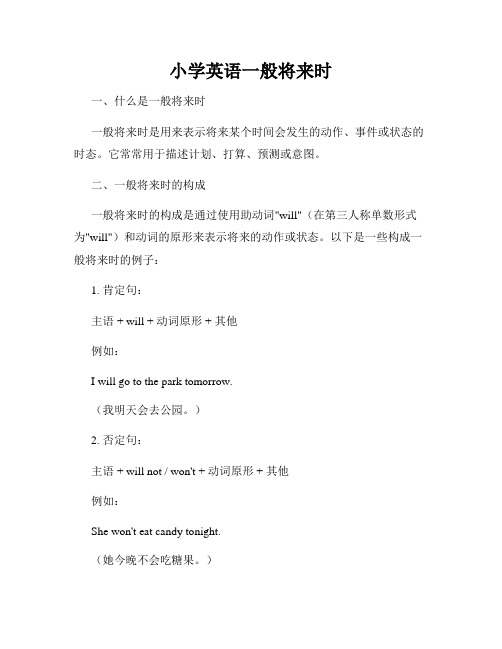
小学英语一般将来时一、什么是一般将来时一般将来时是用来表示将来某个时间会发生的动作、事件或状态的时态。
它常常用于描述计划、打算、预测或意图。
二、一般将来时的构成一般将来时的构成是通过使用助动词"will"(在第三人称单数形式为"will")和动词的原形来表示将来的动作或状态。
以下是一些构成一般将来时的例子:1. 肯定句:主语 + will + 动词原形 + 其他例如:I will go to the park tomorrow.(我明天会去公园。
)2. 否定句:主语 + will not / won't + 动词原形 + 其他例如:She won't eat candy tonight.(她今晚不会吃糖果。
)3. 疑问句:Will + 主语 + 动词原形 + 其他?例如:Will they come to the party?(他们会来参加派对吗?)三、一般将来时的使用场景下面是一些小学英语中常见的使用一般将来时的场景:1. 表示计划或打算:I will visit my grandparents next month.(我下个月会去拜访我的祖父母。
)2. 表示预测或推测:It will rain tomorrow.(明天会下雨。
)3. 表示意愿或承诺:I will help you with your homework.(我会帮你做作业。
)4. 表示未来常态:The school will start at 8:00 AM tomorrow.(明天学校将会在早上8点开始。
)5. 表示请求、命令或建议:Will you please pass me the book?(你能给我递一下那本书吗?)四、注意事项1. "will"后面的动词使用原形形式。
2. 助动词"will"可以缩写成"’ll"。
小学一般将来时讲解精选版

小学一般将来时讲解 Company number【1089WT-1898YT-1W8CB-9UUT-92108】小学一般将来时讲解与练习一、一般将来时的定义:一般将来时表示在将来时间将要发生的动作或存在的状态,与表示将来的时间连用。
tomorrow, next day(week, month, year…),soon, the day after tomorrow(后天)等。
如:She will visit Shanghai tomorrow.二、一般将来时的构成(一)一般将来时有两种构成形式:1.主语+shall/will+do2. 主语+ be going to + do 在表示“打算到某地去时”由于谓语动词go与going重复,一般可以只说be going to a place。
三、一般将来时的用法(一)1.主语+shall/will+do (will可用于所有人称,shall只用于第一人称I和we) 这种结构不是表示自己的打算、意图或计划,而是表示未来的事实或对将来的预测等如:No one will do heavy work.Roberts will do everything for us.2.主语+ be going to + do这种结构常用来表达自己打算做某事、计划做某事或者有意做某事。
注意:be 动词要与主语的人称和数一致,如:I am going to do some reading tomorrow.He is going to have a piano lesson next week.We are going to have a party this Friday.(二)通常情况下will 和 be going to能互换,但是be going to 与will 用法的也是有点区别的1. 只用will不用be going to的情况:①表示对未来时间与年龄的推测时,如:Tomorrow will be Monday.She will be thirteen next year.②表示必然发生时,如:Fish will die without water.People will die if all green plants die.2.只用be going to而不用will的情况:如果表示已有迹象表明在不久的将来要发生的事情时,如:Look at those black clouds, It’s going to rain.(三)某些动词如:go/come/leave/start/begin/arrive等,它们的现在进行时可以表示将来时,如:They are leaving for Shanghaitomorrow.My brother is coming here soon.四、一般将来时的句式变换肯定句:主语+shall/will+do主语+ be going to + do否定句:主语+shall/will+not+do(will not 可缩写成won’t)主语+ be+ not+ going to +do一般疑问句:shall/will+主语+ dobe+主语+going to+do特殊疑问句:疑问词+ shall/will+主语+do疑问词+be+主语+going to+do五.巩固练习一、按要求填空1. 我打算明天和朋友去野炊。
2018小学英语时态复习之一般将来时(ppt课件)

结构:主语+be动词+going to +动词原形+时间副词
主语+ will+ 动词原形+时间副词
如:Jim is going to play football.
Jim will play foot学b习a交ll流. 课件
22
否定形式:在be动词或will后面加not
例如:Jim is not going to play football. Jim will not play football.
2. Sheisgoing to go soon.
read
3. He is going to books this evening.
is改为are
4. My parents is going to Beijing next week.
5. John is go to go to the park.
改为going
Sunday evening.
A. are having
B. are going to have
C. will having D. 学习交流课件 is going to have 28
(A ) 7. He ________ John a new pen.
A. gives
B. gave
C. will giving
经常跟一些表示将来时间的时间状语如:tomorrow、this weekend、next week等连用,用来表示一般将来时态。
主语+be动词+going to +动词原形+时间副词。
学习交流课件
18
人称主语: 单数 第一人称: I 第二人称: you 第三人称: he\ she\
小学毕业英语总复习时态精析第四节一般将来时课件

续表
句型
结构
举例
否定句
主语+will not (won't)+ 动词原形+其 他.
I will not(won't)climb the mountain this week. 这周我不会 去爬山。
We will learn lots of new words this term. 这学期我们将会学很多新单词。 →What will you learn this term? 这 学期你们将会学什么?
【注】will 没有人称和数的变化。will结构多用于表 示客观上将要发生的事情,但很多情况下可与be going to结构互换使用。
3. A: ___Is__sh_e__g_o_in__g_t_o_c_o_o_k__d_in_n__er_?____________ B: Yes,she is going to cook dinner.
4. A: __W__h_e_r_e_a_r_e_y_o_u__g_o_i_n_g_?_________________
Lind A: No, I'm not. I have an art lesson this afternoon. A.Are; swim B.Will; swim C.Are; swimming
( C )5.We are going to cook some fish __________.
A.now
考点精析
考点 考查一般将来时的用法 【例】Read and fill. 用括号内所给单词的适当形式填空。 1.Jack __________ (draw) a birthday cake on the board before the party tomorrow afternoon. 2.The girls __________ (dance) for us at the party tomorrow evening.
小学英语动词时态——一般将来时

小学英语动词时态——一般将来时一般将来时一般将来时的基本概念一般将来时表示将来某一时刻的动作或状态,或将来某一段时间内经常的动作或状态。
一般将来时由助动词shall(第一人称),will(第二、三人称)+动词原形构成。
美国英语则不管什么人称,一律用will。
一般将来时的形式●will 常简略为 'll,并与主语连写在一起,如:I'll,he'll,it'll,we'll,you'll,they'll。
●一般疑问句如用Will you…?其简略答语须是Yes,I will或 No,I will not;如用Shall you…?(较少见)其简略答语须是 Yes,I shall.或 No, I shall not.。
一般将来时的用法1)表示将来的动作或状态一般将来时常与一些表示将来的时间状语连用,如:tomorrow(明天), next week(下周), from now on(从现在开始);in the future(将来)等。
2)表示将来经常发生的动作。
一般将来时的其他用法一般将来时表示将来某一时刻的动作或状态,其表达形式除了“shall(第一人称),will (第二、三人称)+动词原形构成”外,还有以下几种形式。
1)“to be going to+动词原形”表示即将发生的或最近打算进行的事。
例如:①It is going to rain. 要下雨了。
②We are going to have a meeting today. 今天我们开会。
2)go, come,start,move,sail,leave,arrive,stay等可用进行时态表示按计划即将发生的动作,例如: I'm leaving for Beijing. 我要去北京。
3)“be to+动词原形”表示按计划要发生的事或征求对方意见。
例如:①Are we to go on with this work?我们继续干吗?②The boy is to go to school tomorrow.这个男孩明天要去上学。
- 1、下载文档前请自行甄别文档内容的完整性,平台不提供额外的编辑、内容补充、找答案等附加服务。
- 2、"仅部分预览"的文档,不可在线预览部分如存在完整性等问题,可反馈申请退款(可完整预览的文档不适用该条件!)。
- 3、如文档侵犯您的权益,请联系客服反馈,我们会尽快为您处理(人工客服工作时间:9:00-18:30)。
一般将来时的构成:
主语 + be going to + 地方 / 动词原形+(将来时间)…..
火眼金星。看看下面的句子病在哪里呢?
visit
1. We are going to grandparents tomorrow. 2. Sheisgoing to go soon.
结构:主语+be动词+going to +动词原形+时间副词
主语+ will+ 动词原形+时间副词
如:Jim is going to play football.
Jim will play football.
否定形式:在be动词或will后面加not
例如:Jim is not going to play football. Jim will not play football.
什么(提问事、物) 在哪里 (提问地点)
when which
在什么时候 (提问时间) 选择哪一个(提问人或物)
who how
谁 (提问人) 怎么样 (提问方式)
疑问词在句首,系动词be跟着走, 主语、going紧相随,其它成分不要丢。
顺口溜小记:
不久将要发生事,记住要用将来时。 be后紧跟going to,to后跟着动原形。 be有形式多变化,记得随着主语及时变。
What is Lan Yangyang going to do?
He is going to swim.
What is Fei Yangyang going to do?
He is going to catch butterflies.
Be going to 句型 be going to +动词原形:用来表示近期或者事先考虑过的将
I+am He/She+is You/We/They+are 某个人名+is 如:Mike is
一般将来时(the future tense)
一般将来时表示将要发生的事或打算、计划、决定要做
的事情。常与表示将来的时间状语连用。
标志性词:tomorrow, next, soon,
tonight, next week/ weekend/ month/ year, this morning/ afternoon/ evening….等。
一般将来时:
构成:
will be going
to
+
动词原形
will
I am going to listen to music.
一般将来时的标志:
this morning, next week等。
构成:
主语+be Байду номын сангаасoing to + 动词原形+将来的时间
将来的时间:
this morning this afternoon
He is going to ski.
What is Lan Yangyang going to do?
He is going to sweep the floor.
What is Xi Yangyang going to do?
He is going to wash the clothes.
一般疑问句:把be动词或will调到句首,
例如:Is Jim going to play football? Will Jim play football?
小练笔: 1、我打算明天去打扫我的房间。
I'm going to clean my room tomorrow.
2、他这个周末准备去拜访他的祖父母。 He is going to visit his grandparents this weekend. 3、他们下周去旅行。
(the future tense)
•I’ m going to buy a book. •I’ m going to take a look. •I’ m going to bake a cake. •I’ m going to walk near a lake. •We’ re going to take a trip. •We’ re going to take a sip. •I’ m going to have a good day.
read
3. He is going to books this evening.
is改为are
4. My parents is going to Beijing next week. 5. John is go to go to the park.
改为going
be going to+动词原形 = will +动词原形
复数 we you they
be 动词: am (与第一人称单数搭配) are (与第二人称或所有复数主语) is (与第三人称单数或者所有单数主语)
Be going to句型的特殊疑问句形式。
疑问词 + Be动词 +主语 + going (to) +(动作)+(时间副词)?
常用的疑问词有:
what where
要发生的动作,意为:“打算,就 要”。
经常跟一些表示将来时间的时间状语如:tomorrow、this weekend、next week等连用,用来表示一般将来时态。
主语+be动词+going to +动词原形+时间副词。
人称主语: 第一人称: 第二人称: 第三人称:
单数 I you
he\ she\ it\ (人名)
this evening tonight
tomorrow
next week
next weekend next holiday
next month
…等等
next year
What are they going to do?
They are going to ride a bike.
What is Hui Tailang going to do?
写出同义句: 1. I am going to eat. → I _wi_ll _ea_t . 2. He is going to eat. → He _w_ill _e_at. 3. She is going to play the piano. → She _wi_ll _pl_ay the piano. 4. The cat is going to jump. → The cat w_ill _ju_m__p. 5. We are going to fly kites tomorrow. →We _w_ill _fly_k_ite_s tomorrow.
